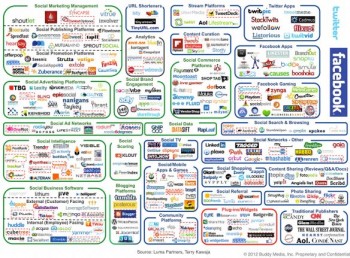Offering Value and Meaning
As more tools and algorithms surface for the purpose of rating influence, across each measure and metric the hardest factor to isolate and measure is topical relevance. I may be influential to the SOBCon on the subject of strategy, small business, start ups, and entrepreneurship, because I’ve established expertise in the area of starting and growing a business. However, I wouldn’t have the same influential relevance on the topic of gourmet cooking or restaurant management.
Without relevance, there is no influence.
5 Ways to Check Whether Your Business Relevance Is Eroding
Eight to ten years ago, the social business Internet was centered in the blogosphere. Blogs were the most common vehicle by which online business people established their identities, connected, and conversed. Individuals picked up the tools and learned the culture from the people they met while using them. Now, this Insane Infographic-of-the-day: Social Media shows the complicated space the social business web has become. …
Blogging platforms have become one unit on a hugely varied landscape for sharing content.
Blogs were once a highly relevant main idea in a chart like that.
Now they are more of a secondary detail in relevance.
Keep up with the changing landscape or lose relevance. Keeping up requires participating and adding unique value to channel and enhance opportunities as the environment changes. Here are 5 ways to check whether your online business relevance is eroding.
- You (your brand or your business) spend more time sharing content than reading it. Strategic sharing can enhance relevance. Through focus and filtering, a business can underscore brand identity, values, expertise, and a service ethic. All of which builds trust and attracts a self-sorting group of ideal customers or clients.
Oversharing without filtering, such as retweeting without reading first, adds noise not value and erodes relevance. Promiscuous sharing destroys relevance.
- You (your brand or your business) value social scores and metrics, such as Klout and follower counts, MORE than conversations with the people who help your business thrive. We can use metrics to fine tune our relevance. Metrics can reveal “who, what, how, when, and how many”.
All metrics and algorithms carry the bias of assumptions about what is being measured. Beware of how metrics flatten data by removing individual particularities. To stay relevant, keep a continuous dialogue with individuals represented by the data. Balance in the people-data equation is foundational to relevance.
- You (your brand or your business) make decisions and develop expertise based on 2nd-hand experiences. Research and reading focused on current cases, predictions, trends, cycles, and conditions can increase relevance. Understanding the breadth of an industry environment extends our ability to recognize and leverage opportunity. Still vicarious knowledge is shallow, fades quickly, and lacks insight.
Turning acquired knowledge into experience by applying it, trying it, testing, and measuring our outcomes increases relevance exponentially. Through application we develop the intuitive detail of experience and the ability to recognize nuance. In that way it erodes relevance.
- You (your brand or your business) have more answers than questions. Sharing answers and solutions is highly relevant. Doing so in the spaces where customers meet to talk — in their language — makes those answers even more relevant.
More powerful than answers are the compelling questions that keep us connecting and searching. Working out and working on deep questions that are critical to our customers’ mission — how they will raise their families, how they can grow their business — offer the people we serve the most relevant connection to our business.
- You (your brand or your business) develop social marketing plans around “online and offline channels” rather than using connect more deeply with the people who build your business. A well-designed outreach strategy can spark relevant human connections.
Reframing social business as customer connections rather than channels, we can build true “other-centered” intimacy into the way we reach out, A view to why people meet in each space changes the way we talk and the topics we talk about. Relevance online and off starts with caring about people.
As information and technology change at the speed of the Internet, staying relevant is a constant and always current criteria of true influence. Focused attention to the new problems, new solutions, and new opportunities that surround them is essential. Without that focus and a clear intention to acquire new competencies, internalize current culture, and cultivate new thinking, that same speed of the Internet can erode, as we continue to do what once made us successful but is no longer needed.
How do you stay irresitibly relevant to the people who help you thrive?
Be irresistible.
–ME “Liz” Strauss
Work with Liz on your business!!




